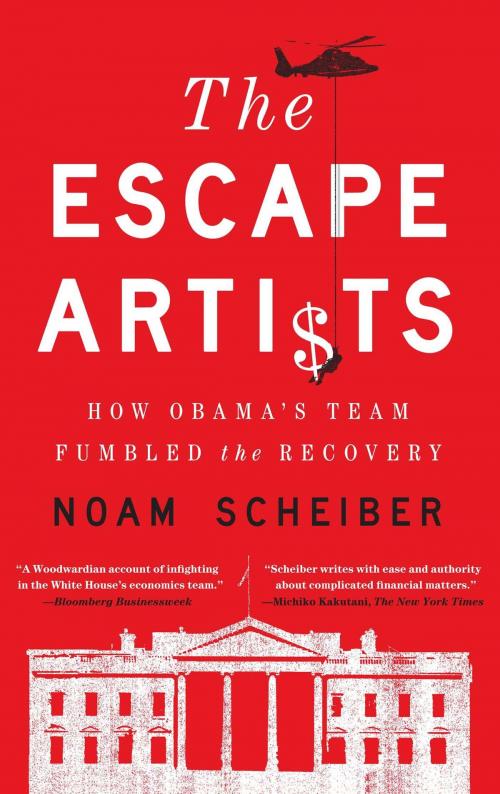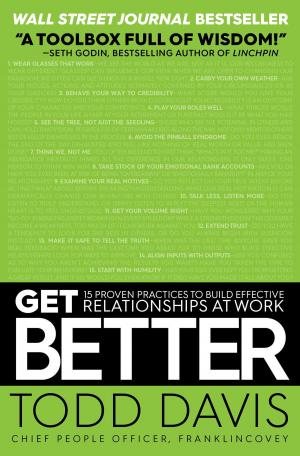The Escape Artists
How Obama's Team Fumbled the Recovery
Nonfiction, Social & Cultural Studies, Political Science, Politics, Economic Policy, Business & Finance, Economics, Economic History| Author: | Noam Scheiber | ISBN: | 9781439172421 |
| Publisher: | Simon & Schuster | Publication: | February 28, 2012 |
| Imprint: | Simon & Schuster | Language: | English |
| Author: | Noam Scheiber |
| ISBN: | 9781439172421 |
| Publisher: | Simon & Schuster |
| Publication: | February 28, 2012 |
| Imprint: | Simon & Schuster |
| Language: | English |
FACING THE WORST ECONOMY SINCE THE 1930S, PRESIDENT BARACK OBAMA HIRED A CRACK TEAM OF ESCAPE ARTISTS: financial wizards who had pulled off numerous white-knuckle getaways during the Clinton era and who were ready to do it all over again. Three years later, with the economy still in a rut, it’s clear that they fell far short. This is the inside story of what went wrong.
The Escape Artists features previously undisclosed internal documents and extensive, original reporting from the highest levels of the administration. Star White House journalist Noam Scheiber reveals the mistakes and missed opportunities that kept the president’s pedigreed team from steering the economy in the right direction. He shows what responsibility the president bears for those missteps, what bold actions his brain trust refused to take despite its preternatural confidence, and how the White House was regularly outmaneuvered by Republicans in Congress.
Tracking the administration’s efforts deep into the fall of 2011, The Escape Artists provides a gripping look inside the meeting rooms, in-boxes, and minds of the men who tried to manage the defining crisis of the Obama presidency: how the very qualities that made these men and women escape artists in the 1990s ultimately failed them.
***
THREE YEARS INTO THE OBAMA PRESIDENCY, THE UNEMPLOYMENT RATE WAS PAINFULLY HIGH, THE GAP BETWEEN RICH AND POOR HAD WIDENED, AND THE STIMULUS HAD NOT DONE ENOUGH TO BRING JOBS BACK. WHAT WENT WRONG?
A PRESIDENT WITH OTHER PRIORITIES . . .
Barack Obama hadn’t run for president just so he could clean up someone else’s mess, however urgent the task. He’d run for president to usher in once-in-a-generation achievements like health care reform—“to change the trajectory of America.”
Timothy Geithner remarked to President-elect Obama that “your signature accomplishment is going to be preventing a Great Depression.” Obama’s response was slightly jarring. “That’s not enough for me,” he said. It dawned on Geithner that he and his colleagues were a sideshow rather than the main attraction. “If you don’t do that, nothing else is possible,” Geithner protested. “Yeah,” Obama repeated, “but that’s not enough.”
AN ECONOMIC TEAM RELUCTANT TO TAKE BOLD ACTION . . .
David Axelrod was preparing Christina Romer, Obama’s chief economist, for a Sunday talk show. Many experts were voicing doubts about the size of the original package, and so Axelrod asked, “Was the stimulus big enough?” Without hesitating, Romer responded, “Abso-f---ing-lutely not.” She said it half-jokingly; Axelrod did not seem amused.
AND A BRAIN TRUST THAT BELIEVED IT KNEW BETTER . . .
It was the worst of all worlds for the Obama administration: a country that took one look at the languishing economy and another at the recovery on Wall Street and concluded that its government had put big banks ahead of ordinary people. Generously, the S&P officials didn’t point out any of this. Instead, the leader of the group confessed that the agency was mostly concerned about the prospects for bipartisan compromise.
At this, Geithner became dismissive. His message was unmistakable:
TRUST US, WE’VE DONE THIS BEFORE.
FACING THE WORST ECONOMY SINCE THE 1930S, PRESIDENT BARACK OBAMA HIRED A CRACK TEAM OF ESCAPE ARTISTS: financial wizards who had pulled off numerous white-knuckle getaways during the Clinton era and who were ready to do it all over again. Three years later, with the economy still in a rut, it’s clear that they fell far short. This is the inside story of what went wrong.
The Escape Artists features previously undisclosed internal documents and extensive, original reporting from the highest levels of the administration. Star White House journalist Noam Scheiber reveals the mistakes and missed opportunities that kept the president’s pedigreed team from steering the economy in the right direction. He shows what responsibility the president bears for those missteps, what bold actions his brain trust refused to take despite its preternatural confidence, and how the White House was regularly outmaneuvered by Republicans in Congress.
Tracking the administration’s efforts deep into the fall of 2011, The Escape Artists provides a gripping look inside the meeting rooms, in-boxes, and minds of the men who tried to manage the defining crisis of the Obama presidency: how the very qualities that made these men and women escape artists in the 1990s ultimately failed them.
***
THREE YEARS INTO THE OBAMA PRESIDENCY, THE UNEMPLOYMENT RATE WAS PAINFULLY HIGH, THE GAP BETWEEN RICH AND POOR HAD WIDENED, AND THE STIMULUS HAD NOT DONE ENOUGH TO BRING JOBS BACK. WHAT WENT WRONG?
A PRESIDENT WITH OTHER PRIORITIES . . .
Barack Obama hadn’t run for president just so he could clean up someone else’s mess, however urgent the task. He’d run for president to usher in once-in-a-generation achievements like health care reform—“to change the trajectory of America.”
Timothy Geithner remarked to President-elect Obama that “your signature accomplishment is going to be preventing a Great Depression.” Obama’s response was slightly jarring. “That’s not enough for me,” he said. It dawned on Geithner that he and his colleagues were a sideshow rather than the main attraction. “If you don’t do that, nothing else is possible,” Geithner protested. “Yeah,” Obama repeated, “but that’s not enough.”
AN ECONOMIC TEAM RELUCTANT TO TAKE BOLD ACTION . . .
David Axelrod was preparing Christina Romer, Obama’s chief economist, for a Sunday talk show. Many experts were voicing doubts about the size of the original package, and so Axelrod asked, “Was the stimulus big enough?” Without hesitating, Romer responded, “Abso-f---ing-lutely not.” She said it half-jokingly; Axelrod did not seem amused.
AND A BRAIN TRUST THAT BELIEVED IT KNEW BETTER . . .
It was the worst of all worlds for the Obama administration: a country that took one look at the languishing economy and another at the recovery on Wall Street and concluded that its government had put big banks ahead of ordinary people. Generously, the S&P officials didn’t point out any of this. Instead, the leader of the group confessed that the agency was mostly concerned about the prospects for bipartisan compromise.
At this, Geithner became dismissive. His message was unmistakable:
TRUST US, WE’VE DONE THIS BEFORE.















